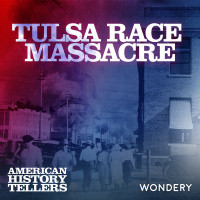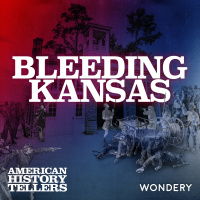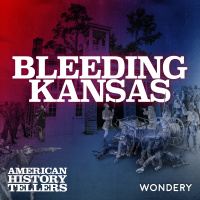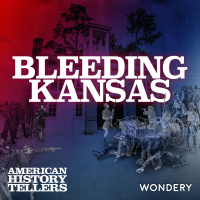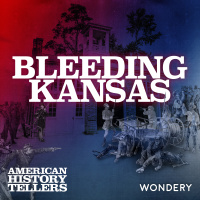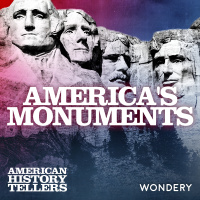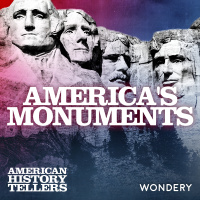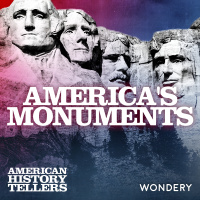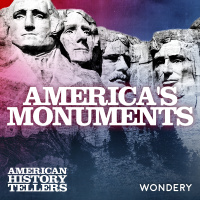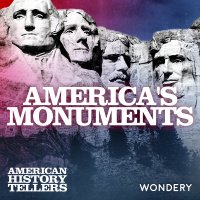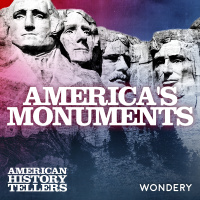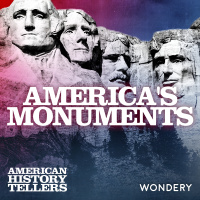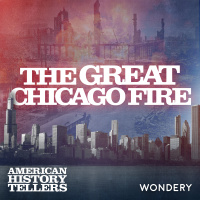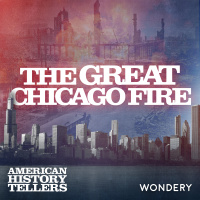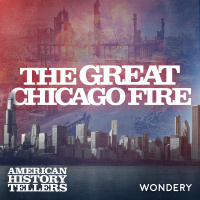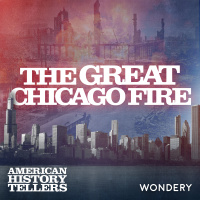Sinopsis
The words you speak. The ideas you share. The freedoms you defend. Every part of your life can be traced to our shared history, but how well do you really know the stories that made America? We’ll take you to the events, the times and the people that shaped our nation and Americans. And we’ll show you how our history affected them, their families and affects you today. Hosted by Lindsay Graham. From Wondery, the network behind Tides Of History, History Unplugged, Fall Of Rome and Dirty John.
Episodios
-
Encore: Tulsa Race Massacre | The Powder Keg | 2
02/06/2021 Duración: 39minAs Black teenager Dick Rowland sat in a jail cell at the Tulsa courthouse, news of his arrest flew through the town. Egged on by rumors about his alleged rape of white teenager Sarah Page, a white mob bent on a lynching Rowland began assembling outside the courthouse. By that evening, the crowd had swelled to thousands. Meanwhile, some young African American veterans of the recent world war were determined to defend Rowland, with their lives if necessary. When they arrived at the courthouse Tuesday night, they found themselves thrust into a situation far more volatile than they were prepared for.This episode originally aired in 2019.Listen to new episodes 1 week early and to all episodes ad free with Wondery+. Join Wondery+ for exclusives, binges, early access, and ad free listening. Available in the Wondery App https://wondery.app.link/historytellers.Support us by supporting our sponsors!See Privacy Policy at https://art19.com/privacy and California Privacy Notice at https://art19.com/privacy#do-not-sel
-
Encore: Tulsa Race Massacre | The Promised Land | 1
26/05/2021 Duración: 48minIn 1921, Tulsa, Oklahoma boasted one of the nation’s most prosperous African-American communities. Greenwood was home to 108 Black-owned businesses, two theaters, 15 physicians, two newspapers, and a luxury hotel. It was nicknamed “the Black Wall Street.”Then, on May 30th, a Black shoeshine boy named Dick Rowland was accused of assaulting a white teenaged elevator operator, Sarah Page. What happened next would ultimately lead to the destruction of Greenwood and the deaths of over 300 African Americans -- a massacre that, until recently, was virtually erased from American history.This episode originally aired in 2019.Listen to new episodes 1 week early and to all episodes ad free with Wondery+. Join Wondery+ for exclusives, binges, early access, and ad free listening. Available in the Wondery App https://wondery.app.link/historytellers.Support us by supporting our sponsors!See Privacy Policy at https://art19.com/privacy and California Privacy Notice at https://art19.com/privacy#do-not-sell-my-info.
-
The Mystery of D.B. Cooper | The Man in Row 18 | 1
19/05/2021 Duración: 35minOn November 24th, 1971, a man on a Boeing 727 bound for Seattle handed a flight attendant a note that read, “Miss, I have a bomb here.” No one knew the man’s real name. But soon, the press was calling him D.B. Cooper -- and his hijacking of Northwest Orient Flight 305 would go down as one of the most audacious in aviation history.Cooper parachuted out of that flight with $200,000 in cash, then disappeared without a trace. Over the decades that followed, FBI agents and amateur investigators would pursue thousands of leads and hundreds of suspects. And the mystery of what really happened in the skies over Washington that night has only grown deeper.Listen to new episodes 1 week early and to all episodes ad free with Wondery+. Join Wondery+ for exclusives, binges, early access, and ad free listening. Available in the Wondery App https://wondery.app.link/historytellers.Support us by supporting our sponsors!See Privacy Policy at https://art19.com/privacy and California Privacy Notice at https://art19.com/privacy#d
-
Bleeding Kansas | The Man Who Sparked the Civil War | 5
12/05/2021 Duración: 43minJohn Brown has been called many things: fanatic, hero, terrorist, martyr, zealot. Some of his contemporaries, including Frederick Douglass, believed that were it not for his raid on Harpers Ferry, the Civil War would never have started. But did Brown’s actions really bring about slavery’s eventual downfall? And can his impact still be seen today in a nation that remains deeply divided over issues of race?In this episode, Lindsay discusses Brown’s complex legacy with historian David S. Reynolds, author of John Brown, Abolitionist: The Man Who Killed Slavery, Sparked the Civil War, and Seeded Civil Rights.Listen to new episodes 1 week early and to all episodes ad free with Wondery+. Join Wondery+ for exclusives, binges, early access, and ad free listening. Available in the Wondery App https://wondery.app.link/historytellers.Support us by supporting our sponsors!See Privacy Policy at https://art19.com/privacy and California Privacy Notice at https://art19.com/privacy#do-not-sell-my-info.
-
Bleeding Kansas | His Soul Goes Marching On | 4
05/05/2021 Duración: 38minOn October 17th, 1859, John Brown was barricaded inside the federal armory at Harpers Ferry with his hostages and his remaining followers. His attempt to lead an antislavery insurrection had failed. A detachment of U.S. Marines led by Colonel Robert E. Lee had the armory surrounded. For the radical abolitionist, it was his last stand.But after he was captured and sentenced to death, Northern abolitionists rallied to Brown’s cause. By the time he ascended the scaffold and prepared to meet the hangman’s rope, Brown had become a martyr and folk hero. His bold, violent actions polarized Americans on both sides of the slavery debate, and hurtled the nation closer to the brink of the Civil War.Listen to new episodes 1 week early and to all episodes ad free with Wondery+. Join Wondery+ for exclusives, binges, early access, and ad free listening. Available in the Wondery App https://wondery.app.link/historytellers.Support us by supporting our sponsors!See Privacy Policy at https://art19.com/privacy and California Pri
-
Bleeding Kansas | The Raid on Harpers Ferry | 3
28/04/2021 Duración: 36minIn December 1858, John Brown was back in Kansas and Missouri, making headlines for dramatic and deadly raids on plantations. He and his followers freed 11 enslaved men and women and led them on an 1,100-mile journey to freedom in Canada.But all the while, Brown was focused on finally launching his long-planned attack on slavery in Harpers Ferry, Virginia. After months of preparation, on the night of October 16th, 1859, Brown and his “army” captured the town’s federal arsenal and armory. It was the start of 36 hours of chaos and bloodshed that would shake America to its core.Listen to new episodes 1 week early and to all episodes ad free with Wondery+. Join Wondery+ for exclusives, binges, early access, and ad free listening. Available in the Wondery App https://wondery.app.link/historytellers.Support us by supporting our sponsors!See Privacy Policy at https://art19.com/privacy and California Privacy Notice at https://art19.com/privacy#do-not-sell-my-info.
-
Bleeding Kansas | The Pottawatomie Massacre | 2
21/04/2021 Duración: 39minOn the night of May 24th, 1856, radical abolitionist John Brown and seven of his followers crept along the banks of Kansas’s Pottawatomie Creek and stormed a proslavery settlement. They dragged five men from their cabins and killed them in cold blood. Soon, Brown’s name was splashed across the nation’s newspapers, making him a lightning rod for controversy. He would exploit his notoriety to escalate his crusade against slavery, taking his guerrilla war to a new theater: the slaveholding South.Support us by supporting our sponsors!See Privacy Policy at https://art19.com/privacy and California Privacy Notice at https://art19.com/privacy#do-not-sell-my-info.
-
Bleeding Kansas | John Brown's Crusade | 1
14/04/2021 Duración: 40minIn the 1850s, the United States was lurching toward a crisis over slavery -- and abolitionist John Brown stepped into the fray. Brown believed it was his God-given destiny to destroy slavery. His crusade took him from abolitionist meetings in the Northeast, to the Underground Railroad in Ohio, to the bloody plains of Kansas.In 1854, a fierce conflict erupted over whether the territory of Kansas would join the Union as a free state or slave state. As tensions escalated, Brown would rush to the center of the gathering storm and hatch a violent plan for striking back against proslavery forces.Listen to new episodes 1 week early and to all episodes ad free with Wondery+. Join Wondery+ for exclusives, binges, early access, and ad free listening. Available in the Wondery App https://wondery.app.link/historytellers.Support us by supporting our sponsors!See Privacy Policy at https://art19.com/privacy and California Privacy Notice at https://art19.com/privacy#do-not-sell-my-info.
-
America's Monuments | The Trouble With Confederate Statues | 7
07/04/2021 Duración: 38minIn recent years, there’s been a movement to remove statues of Confederate leaders and other monuments that some see as celebrations of America’s racist history. But does taking down these statues help address the racial inequities that plague our nation to this day? Or is it just erasing history? In his forthcoming book How the Word Is Passed: A Reckoning With the History of Slavery Across America, author Clint Smith tackles these and other questions around what our public monuments say -- or, sometimes, fail to say -- about America’s past. He and Lindsay discuss such landmarks as Monticello, the Whitney Plantation, and the Statue of Liberty, and explore the different meanings they have for different Americans, especially in our present moment of racial reckoning.For more on Clint Smith: https://www.clintsmithiii.com/ Listen to new episodes 1 week early and to all episodes ad free with Wondery+. Join Wondery+ for exclusives, binges, early access, and ad free listening. Available in the Wondery App h
-
America's Monuments | 58,000 Names | 6
31/03/2021 Duración: 37minThe Vietnam War was one of the most divisive conflicts in American history. Over 58,000 Americans died in the fighting; many more returned home with wounds both visible and hidden. When veterans lobbied for a memorial to honor American soldiers lost in Vietnam, a young college student named Maya Lin was picked from a blind competition to design it. Her unconventional vision would lead to a bitter dispute over the nature and purpose of public art in America — and how a nation heals its wounds after a collective loss. Listen to new episodes 1 week early and to all episodes ad free with Wondery+. Join Wondery+ for exclusives, binges, early access, and ad free listening. Available in the Wondery App https://wondery.app.link/historytellers.Support us by supporting our sponsors!See Privacy Policy at https://art19.com/privacy and California Privacy Notice at https://art19.com/privacy#do-not-sell-my-info.
-
America's Monuments | The Mansion of the King | 5
24/03/2021 Duración: 40minFew historic residences are more synonymous with their owners than Graceland. Purchased by Elvis Presley in 1957, the stately Memphis mansion was the heart of his private world and his most prized possession. He always swore he’d never sell it. But after Elvis’s sudden and tragic death, Graceland faced an uncertain future. It would take a risky move by his ex-wife Priscilla to save the mansion and secure its place as a lasting monument to one of America’s greatest musical icons.Listen to new episodes 1 week early and to all episodes ad free with Wondery+. Join Wondery+ for exclusives, binges, early access, and ad free listening. Available in the Wondery App https://wondery.app.link/historytellers.Support us by supporting our sponsors!See Privacy Policy at https://art19.com/privacy and California Privacy Notice at https://art19.com/privacy#do-not-sell-my-info.
-
America's Monuments | The Longest Bridge | 4
17/03/2021 Duración: 36minIn the early 1920s, San Francisco was a picturesque city on a narrow, isolated peninsula. Known for its scenic, natural beauty, it had the potential to become one of America’s leading metropolises. But to fuel its economic growth, it needed a bridge -- across one of the most treacherous bodies of water on the Western seaboard.To build a bridge across the strait known as the Golden Gate, engineers and construction crews would have to fight against blistering winds, vicious currents, and punishing weather. Workers would dive below the frigid water, and ascend to breathtaking heights. In the end, they would forge an engineering marvel at the western entrance to America – and capture the spirit of an iconic city. Listen to new episodes 1 week early and to all episodes ad free with Wondery+. Join Wondery+ for exclusives, binges, early access, and ad free listening. Available in the Wondery App https://wondery.app.link/historytellers.Support us by supporting our sponsors!See Privacy Policy at https://art1
-
America's Monuments | Four Faces | 3
10/03/2021 Duración: 40minIn 1927, workers began blasting granite rock off a towering cliff in South Dakota’s Black Hills. It was the start of an arduous 14-year struggle to carve the portraits of four American presidents into Mount Rushmore.The feat required grueling labor in extreme conditions. And it was led by an obsessive sculptor named Gutzon Borglum. Borglum was the creative genius behind Rushmore, with a talent and ego as big as the monument itself. But he was also the biggest threat to its completion.His masterpiece would become one of the most iconic — and controversial — monuments in America. Listen to new episodes 1 week early and to all episodes ad free with Wondery+. Join Wondery+ for exclusives, binges, early access, and ad free listening. Available in the Wondery App https://wondery.app.link/historytellers.Support us by supporting our sponsors!See Privacy Policy at https://art19.com/privacy and California Privacy Notice at https://art19.com/privacy#do-not-sell-my-info.
-
America’s Monuments | A Passage Through Panama | 2
03/03/2021 Duración: 38minFor centuries, sailors and merchants dreamed of finding a passage between the Atlantic and Pacific Oceans across the narrow isthmus of Central America. But no natural passage existed. To get ships across the fifty-mile stretch of land, someone would have to dig a canal.The French tried first, and failed. Then, in 1904, President Theodore Roosevelt and the U.S. took on the challenge. Struggling against harsh weather, forbidding terrain and political turmoil, the United States would endeavor not just to build a canal – but to establish itself as a formidable international power in the new century.Listen to new episodes 1 week early and to all episodes ad free with Wondery+. Join Wondery+ for exclusives, binges, early access, and ad free listening. Available in the Wondery App https://wondery.app.link/historytellers.Support us by supporting our sponsors!See Privacy Policy at https://art19.com/privacy and California Privacy Notice at https://art19.com/privacy#do-not-sell-my-info.
-
America’s Monuments | The Colossus of New York Harbor | 1
24/02/2021 Duración: 39minIt’s perhaps the most iconic of American monuments -- the Statue of Liberty. A towering 305-foot sculpture of copper and steel that is synonymous with American values of liberty, freedom and self-determination. But it began as a gift from France. And when it first arrived on American soil, its future was far from certain.For over a decade, artists, craftsmen and everyday people from France and the United States worked together on what would be dubbed America’s “New Colossus.” The statue they built would take on new associations with the passage of time -- but it would forever remain a symbol of America’s loftiest ideals.Listen to new episodes 1 week early and to all episodes ad free with Wondery+. Join Wondery+ for exclusives, binges, early access, and ad free listening. Available in the Wondery App https://wondery.app.link/historytellers.Support us by supporting our sponsors!See Privacy Policy at https://art19.com/privacy and California Privacy Notice at https://art19.com/privacy#do-not-sell-my-info.
-
Great Chicago Fire | Out of the Ashes | 4
17/02/2021 Duración: 32minAfter the 1871 fire destroyed a third of their city, Chicagoans wanted to do more than rebuild. They wanted to envision a new kind of American city. That included everything from changes to fire codes and labor laws to an entirely new style of architecture -- the skyscraper.Professor Ann Keating is an urban historian and expert on Chicago history both before and after the Great Fire. She and Lindsay discuss the rapid growth and social changes that made Chicago so vulnerable, what lessons city leaders learned -- or failed to learn -- in the fire’s aftermath, and the parallels between the Great Chicago Fire and other, more recent urban disasters.Listen to new episodes 1 week early and to all episodes ad free with Wondery+. Join Wondery+ for exclusives, binges, early access, and ad free listening. Available in the Wondery App https://wondery.app.link/historytellers.Support us by supporting our sponsors!See Privacy Policy at https://art19.com/privacy and California Privacy Notice at https://art19.com/privacy#do-n
-
Great Chicago Fire | The Great Rebuilding | 3
10/02/2021 Duración: 40minAs dawn broke on October 10, 1871, the dazed survivors of the Great Chicago Fire stumbled through their burned and battered city. A 30-hour inferno had reduced Chicago to ashes.Homes and business were replaced by gaping holes and smoldering rubble. Tens of thousands of people had lost their houses and jobs. Many had lost loved ones. As aid poured into the city, officials turned their attention to the challenges of distributing relief and maintaining order.But the embers had barely cooled when residents went to work throwing up makeshift structures and reopening their businesses. Over the next two years, Chicagoans would rapidly rebuild their city. It was the start of a recovery that would spur architectural innovation and urban renewal, turning Chicago into a modern metropolis.Listen to new episodes 1 week early and to all episodes ad free with Wondery+. Join Wondery+ for exclusives, binges, early access, and ad free listening. Available in the Wondery App https://wondery.app.link/historytellers.Support
-
Great Chicago Fire | Fleeing the Flames | 2
03/02/2021 Duración: 35minJust before midnight on October 8, 1871, the inferno that had ravaged Chicago’s West Side leapt the Chicago River. A wall of flames surged toward downtown, threatening to devour Chicago’s most magnificent hotels, offices, and government buildings. Mayor Roswell B. Mason raced to the Chicago courthouse, but he would soon find he was helpless to save his city.Panic-stricken South Side residents streamed out of their homes and fled to the North Side, the stately residential area they were certain was safe. Dodging flaming debris and crashing buildings, they flooded the streets. But the fire’s path of destruction was relentless. The flames were following the refugees to the North Side, hurtling straight toward the Chicago Waterworks.It was the final link in the city’s defense. Chicagoans knew that if the Waterworks burned, their city was doomed.Listen to new episodes 1 week early and to all episodes ad free with Wondery+. Join Wondery+ for exclusives, binges, early access, and ad free listening. Available in the
-
Great Chicago Fire | We Are Going to Have a Burn | 1
27/01/2021 Duración: 35minIn 1871, Chicago was the fastest growing city in the world. Built almost entirely of wood, it was also a tinderbox. That October, a severe drought ravaged the city. Fires ignited constantly, and Chicago’s firefighters were at their breaking point. But the worst was yet to come.On a hot, windy night, a fire broke out in a barn owned by Irish immigrants Catherine and Patrick O’Leary. By the time firefighters arrived to the scene, gale-force winds were fanning the flames with astonishing speed. Over the next 30 hours, Chicago would battle a raging inferno more destructive than any ever faced by an American city. But from the ashes would also come rebirth—a transformation that would turn Chicago into a modern metropolis.Listen to new episodes 1 week early and to all episodes ad free with Wondery+. Join Wondery+ for exclusives, binges, early access, and ad free listening. Available in the Wondery App https://wondery.app.link/historytellers.Support us by supporting our sponsors!See Privacy Policy at https://ar
-
Presidential Inaugurations: Traditions, Crisis, and Unity | 1
20/01/2021 Duración: 35minAs America prepares to swear in a new president, we’ll look back to the inaugurations of the past. Jim Bendat, author of Democracy's Big Day: The Inauguration of Our President, 1789-2013, joins us as we cover the friction between the outgoing and incoming president, the Capitol Hill breach on January 6th, and how inaugurations have served as a powerful reminder of the strength of American democracy, even in times of crisis.For more on Jim Bendat: https://www.inaugurationbook.com/.Listen to new episodes 1 week early and to all episodes ad free with Wondery+. Join Wondery+ for exclusives, binges, early access, and ad free listening. Available in the Wondery App https://wondery.app.link/historytellers.Support us by supporting our sponsors!See Privacy Policy at https://art19.com/privacy and California Privacy Notice at https://art19.com/privacy#do-not-sell-my-info.

